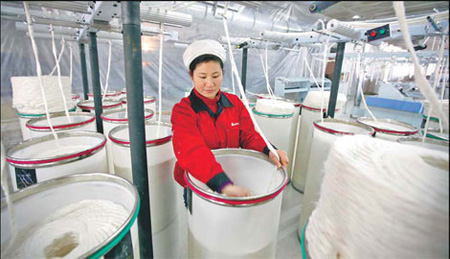Economy
Manufacturing production slows
By Chen Jia (China Daily)
Updated: 2011-07-02 09:04
 |
Large Medium Small |
|
 |
|
A textile factory in Huaibei, Anhui province. China's Purchasing Managers' Index, an indicator of manufacturing activity, declined to 50.9 in June from 52 in May. [Photo / China Daily] |
June PMI fell to 50.9, indicating a slowdown in national economy
BEIJING - China's manufacturing production fell to a 28-month low in June, indicating a sizeable slowdown in economic growth against a recent background of soaring inflation.
However, the inflationary pressure is likely to ease in the second half of the year, with both manufacturing input and output prices showing a slower rate of increase, according to a statement on the website of the China Federation of Logistics and Purchasing (CFLP).
| ||||
The June figure follows readings of 52.9 in April and 53.4 in March. A reading above 50 means an expansion in manufacturing activity, while one below 50 indicates a contraction.
A heated debate is emerging in Beijing about whether the current monetary policy is overly tight and damaging to the economy.
At a forum last weekend, Professor Li Yining of Peking University argued that stagflation is likely to develop if monetary policy is further tightened.
Qu Hongbin, chief economist for China and co-head of Asian Economic Research at HSBC Holdings PLC, said that "the slowdown implies that policy tightening is working, pointing to a peak in inflation in the coming months".
The final June PMI reading confirmed that both manufacturing activity and inflation are slowing, he said. HSBC had released a lower preliminary PMI figure of 50.1 about a week ago.
Qu predicted GDP of around 9 percent for the whole year, given the year-on-year industrial output growth of 12 percent.
Gao Ting, head of the Wealth Management Research Department of UBS Securities Co Ltd in China, said that reductions in exports and consumption have contributed to the slowdown during the past month, but fixed asset investment still increased at a rapid pace, supporting a moderate expansion of the economy.
"The nation's economy is not likely to face a hard landing, and the slow growth rate may stop soon," said Gao, who predicted full-year GDP growth of 9.3 percent.
China's economic development may maintain a slower pace in July and August, but expansion is expected to be stable in the fourth quarter of the year, given a gradual easing of inflationary pressure, according to the statement from the CFLP.
A sub-index of manufacturing input prices has declined for four consecutive months to 56.7 in June, compared with 60.3 in May. That means that imported inflation, pushed higher by soaring global commodity prices, is easing, said the CFLP.
In addition, the PMI for the agricultural food-processing industry was 60.1 in June, 5.5 points higher than in May, indicating sufficient food supply in the market. Food prices are not likely to rise much higher in the future, despite floods in southern China, according to the CFLP.
| 分享按钮 |



